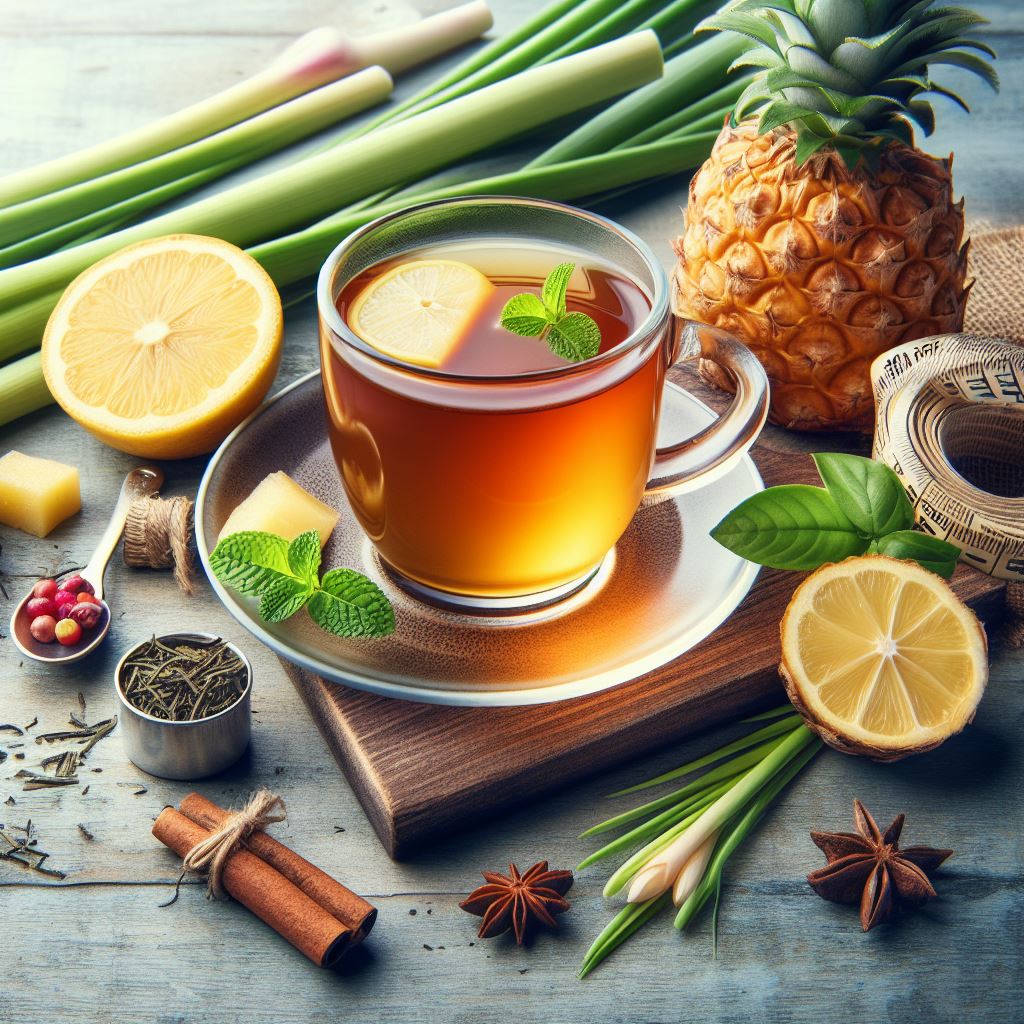If you have ever experienced the discomfort of gastritis, you know how unpleasant it can be. Gastritis is a condition that causes inflammation of the stomach lining, resulting in symptoms such as indigestion, bloating, nausea, and burning pain. While there are medical treatments available for gastritis relief, some people prefer to look for natural remedies that can help ease their symptoms and support their digestive health. One of the most popular and effective natural solutions for gastritis relief include drinking teas!

Tea is not only a delicious and comforting beverage, but also a powerful healing agent that can soothe your stomach and reduce inflammation. However, not all teas are created equal when it comes to gastritis relief. Some teas may actually worsen your condition by irritating your stomach lining or increasing acidity.
That’s why we have created this ultimate guide to help you choose the best teas for gastritis relief. In this guide, you will learn:
- What causes gastritis and how to recognize its symptoms
- How to choose the right tea for gastritis relief based on its properties and benefits
- How to prepare and enjoy these teas effectively
- How to incorporate tea into your daily routine and lifestyle
- How to supplement your tea consumption with other tips and tricks for gastritis management
By following this guide, you will be able to find the perfect tea for your needs and preferences, and enjoy its soothing effects on your stomach and overall well-being. So grab your favorite mug and let’s get started!
Understanding Gastritis

Before we dive into the world of teas, let’s first understand what gastritis is and what causes it. Gastritis is a general term that refers to any condition that involves inflammation of the stomach lining. The stomach lining is a protective layer that prevents the stomach acid from damaging the stomach tissue. When this lining becomes inflamed, it can cause various symptoms, such as:
- Indigestion: A feeling of discomfort or pain in the upper abdomen after eating or drinking
- Bloating: A feeling of fullness or pressure in the abdomen
- Nausea: A feeling of sickness or urge to vomit
- Burning pain: A sharp or dull pain in the stomach area that may radiate to the chest or back
Gastritis can be acute or chronic. Acute gastritis comes on suddenly and severely, while chronic gastritis lasts for a longer time. Different factors can cause different types of gastritis, such as:
- Infection: The most common cause of gastritis worldwide is an infection by a type of bacteria called Helicobacter pylori (H. pylori), which can damage the stomach lining and increase the risk of ulcers and cancer.
- Medication: Certain medications, such as nonsteroidal anti-inflammatory drugs (NSAIDs), aspirin, steroids, or antibiotics, can irritate the stomach lining and cause gastritis.
- Alcohol: Excessive alcohol consumption can erode the stomach lining and increase acidity, leading to gastritis.
- Stress: Physical or emotional stress can affect the production of stomach acid and impair the healing of the stomach lining, causing gastritis.
- Diet: Eating spicy, acidic, fried, or processed foods can aggravate the stomach lining and trigger gastritis symptoms.
- Other factors: Some other factors that can cause or contribute to gastritis include smoking, autoimmune disorders, bile reflux, food allergies, or genetic predisposition.
The treatment of gastritis depends on its cause and severity. In some cases, medication may be necessary to reduce inflammation, heal ulcers, or eradicate H. pylori infection. However, in many cases, lifestyle changes and natural remedies can help manage gastritis symptoms and prevent complications.
One of the most important lifestyle changes for gastritis management is following a healthy diet that avoids foods that irritate the stomach and includes foods that support digestive health. One of the best foods for digestive health is tea.
Choosing the Right Teas for Gastritis Relief

Tea is one of the most widely consumed beverages in the world, and for good reason. Tea has many health benefits, such as antioxidant, anti-inflammatory, antibacterial, antiviral, antifungal, anticancer, antidiabetic, cardioprotective, neuroprotective, and immunomodulatory effects (Khan & Mukhtar, 2013).
However, not all teas are equally beneficial for gastritis relief. Some teas may actually worsen your condition by irritating your stomach lining or increasing acidity. Therefore, you need to be careful when choosing teas for gastritis relief.
The key factors to consider when selecting teas for gastritis relief are:
- Acidity: Teas that are high in acidity can aggravate your stomach lining and cause more pain and inflammation. Therefore, you should avoid teas that are acidic or contain citrus fruits, such as lemon, orange, or grapefruit.
- Caffeine: Teas that contain caffeine can stimulate the production of stomach acid and cause more irritation and discomfort. Therefore, you should avoid teas that contain caffeine or limit your intake to small amounts. Caffeinated teas include black, green, white, oolong, and mate teas.
- Flavors: Teas that contain artificial flavors, sweeteners, or additives can also irritate your stomach lining and cause more symptoms. Therefore, you should opt for teas that are natural and organic, and avoid adding sugar, honey, or milk to your tea, as they can also increase acidity and inflammation.
Based on these factors, the best teas for gastritis relief are herbal teas that are low in acidity and caffeine, and high in anti-inflammatory and soothing properties. Herbal teas are made from various parts of plants, such as flowers, leaves, roots, seeds, or bark. They have been used for centuries as natural remedies for various ailments, including digestive disorders.
Some of the best herbal teas for gastritis relief are:
- Chamomile Tea: Chamomile is a flower that has a calming effect on the digestive system and the nervous system. It can help reduce inflammation, spasms, pain, and nausea caused by gastritis. Chamomile tea also has antibacterial and antifungal properties that can help fight H. pylori infection and prevent ulcers.
- Ginger Tea: Ginger is a root that has a warming and stimulating effect on the digestive system. It can help improve digestion, reduce inflammation, and relieve nausea and vomiting caused by gastritis. Ginger tea also has antibacterial and antiviral properties that can help fight infection and boost immunity.
- Peppermint Tea: Peppermint is a leaf that has a cooling and refreshing effect on the digestive system. It can help relax the stomach muscles and alleviate bloating, gas, and cramps caused by gastritis. Peppermint tea also has antibacterial and antispasmodic properties that can help prevent infection and ulcers.
- Licorice Root Tea: Licorice root is a root that has a sweet and soothing effect on the digestive system. It can help protect the stomach lining from damage and inflammation caused by gastritis. Licorice root tea also has anti-inflammatory and anti-ulcer properties that can help heal ulcers and prevent complications.
These are some of the most effective herbal teas for gastritis relief, but there are many others that you can try as well, such as fennel, marshmallow root, slippery elm, turmeric, oregano tea, or Madagascar burnt rice tea. The key is to find the tea that works best for you and your symptoms.
Incorporating Teas into Your Routine for Gastritis Relief

Once you have chosen your preferred tea for gastritis relief, you need to know how to incorporate it into your daily routine and lifestyle. Here are some tips on when and how to enjoy these teas effectively:
- Timing: The best time to consume tea for gastritis relief is before or after meals or during periods of discomfort. Drinking tea before meals can help prepare your stomach for digestion and prevent irritation from food. Drinking tea after meals can help soothe your stomach and aid digestion. Drinking tea during periods of discomfort can help relieve pain and inflammation.
- Preparation: The best way to prepare these teas is to use fresh or dried herbs and boiling water. You can use a teapot, a strainer, or a tea infuser to brew your tea. You can also use pre-packaged tea bags or capsules if they are natural and organic. The general rule is to use one teaspoon of herb per cup of water and steep for 5 to 10 minutes. You can adjust the amount of herb or steeping time according to your taste and preference.
- Pairings: The best way to enjoy these teas is to pair them with complementary foods or snacks that can enhance their benefits and provide relief. For example, you can pair chamomile tea with oatmeal or crackers, ginger tea with apple slices or nuts, peppermint tea with yogurt or cheese, or licorice root tea with honey or dates. These foods can also provide fiber, protein, vitamins, minerals, and antioxidants that can support your digestive health.
By following these tips, you will be able to make the most out of these teas for gastritis relief and enjoy their soothing effects on your stomach and overall well-being.
General Tips for Gastritis Management

In addition to incorporating these teas into your routine and lifestyle, there are some other tips and tricks that you can follow to manage gastritis symptoms and prevent complications:
- Diet Modifications: One of the most important steps in managing gastritis is following a healthy diet that avoids foods that irritate the stomach and includes foods that support digestive health. Some foods to avoid include spicy, acidic, fried, or processed foods, alcohol, caffeine, and chocolate. Some foods to include are bland, low-fat, and high-fiber foods, such as fruits, vegetables, whole grains, lean meats, and dairy products.
- Stress Reduction Techniques: Another important step in managing gastritis is managing stress and anxiety, as they can affect the production of stomach acid and impair the healing of the stomach lining. Some stress reduction techniques that you can try include meditation, yoga, breathing exercises, aromatherapy, massage, or counseling. These techniques can help you relax your mind and body, and cope with negative emotions and thoughts that may trigger gastritis symptoms.
- Hydration: Another important step in managing gastritis is staying hydrated and incorporating water intake alongside tea consumption. Water can help flush out toxins and bacteria from your stomach and intestines, and prevent dehydration and constipation that may worsen gastritis symptoms. You should aim to drink at least eight glasses of water per day, and avoid carbonated, sugary, or alcoholic beverages that can irritate your stomach lining.
- Consultation: The final and most important step in managing gastritis is consulting with your healthcare professional before making significant changes to your diet or adding herbal remedies. Your healthcare professional can help you diagnose the cause and severity of your gastritis, prescribe appropriate medication if needed, monitor your progress, and advise you on the best course of action for your condition. You should also inform your healthcare professional about any allergies, medical conditions, or medications that you have, as they may affect your choice of teas or other remedies.
Conclusion
If you suffer from gastritis, you know how painful and frustrating it can be. But you don’t have to rely on medication alone to treat your condition. You can also use natural remedies like tea to soothe your stomach and improve your digestion.
Tea is a wonderful drink that can heal and nourish your body. But not all teas are suitable for gastritis. You need to choose teas that are gentle, anti-inflammatory, and soothing for your stomach lining. Some of the best teas for gastritis are chamomile, ginger, peppermint, and licorice root.
In this guide, we have shown you how to select, prepare, and enjoy these teas for gastritis relief. Not only this, we have also given you some tips on how to incorporate tea into your daily routine and lifestyle, and how to complement it with other gastritis-friendly habits.
We hope this guide has helped you find the perfect tea for your needs and preferences. Hopefully you can enjoy the benefits of these teas on your stomach and overall well-being.
Please share this guide with anyone who may benefit from it. And don’t forget to leave us a comment below and tell us which tea worked best for you or if you have any questions or suggestions.
Thank you for reading and happy sipping!
Discover more tea-related articles:
- Milk Thistle Tea: The Ultimate Brew for Wellness and Vitality
- Chilled Bliss: How to Create Refreshing Tea Infused Ice Cubes
- Energize Your Tea: Unleashing the Power within Your Cup
- Tea and Menstruation: How to Brew Your Way to a Better Period
- How to Make Your Own Chai Tea Blends
Sources:





Leave a Comment